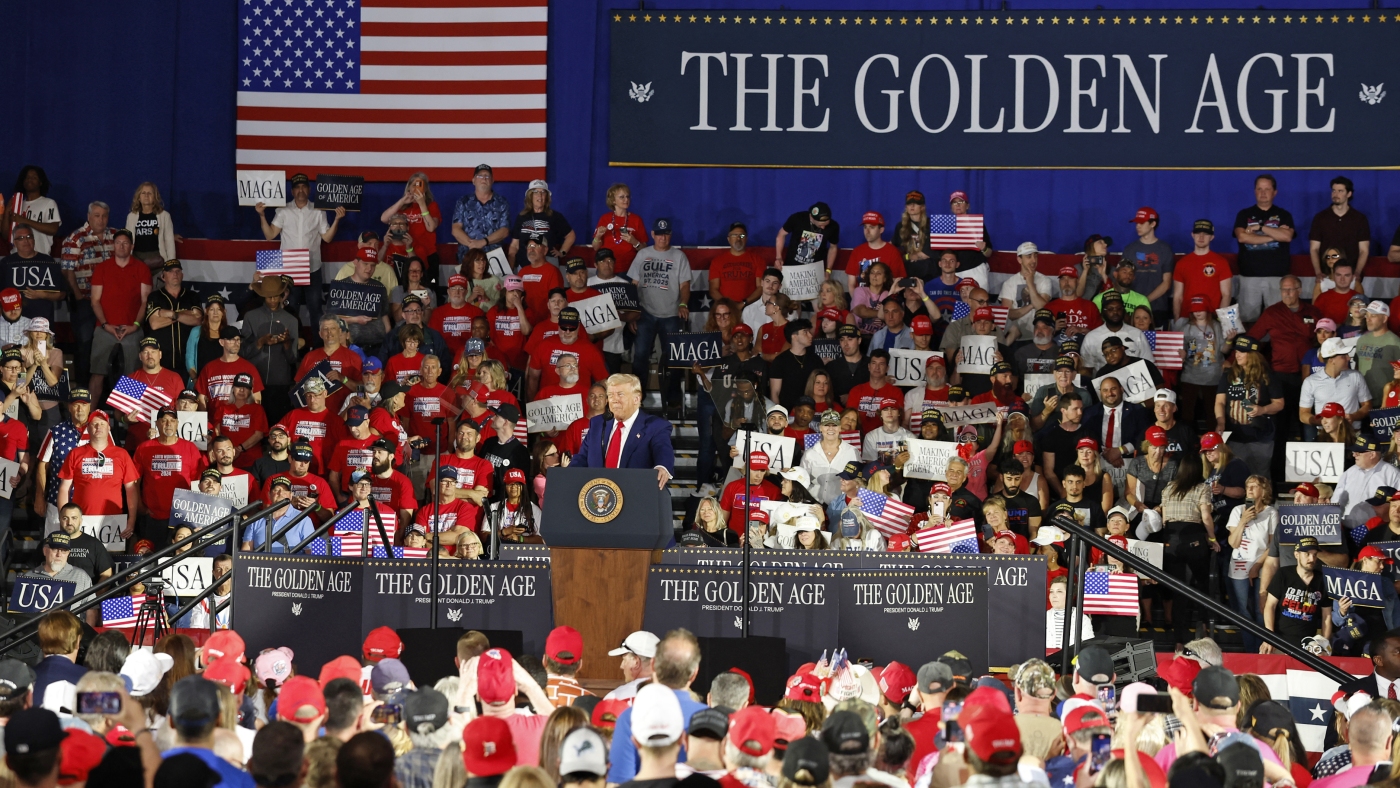Introduction
In the ever-shifting landscape of American politics, few states embody the nation’s political volatility as vividly as Michigan. The state, with its rich industrial history and diverse population, serves as a microcosm of the broader national debates. President Trump’s visit to Macomb County, Michigan, on April 29, 2025, marked a pivotal moment in his second term, offering a glimpse into the intricate dance between local politics, economic concerns, and national agendas. This visit, strategically timed to coincide with his first 100 days in office, was more than just a ceremonial event; it was a calculated move to solidify support in a crucial swing region.
The Political Landscape of Macomb County
Macomb County, often referred to as a classic swing county, has a history of political volatility. It voted twice for Barack Obama before swinging to Donald Trump in the subsequent election. This political seesawing makes Macomb County a critical battleground for any presidential administration. Trump’s visit to this county was not just about celebrating his first 100 days; it was a strategic effort to shore up his support in a region where political allegiances can shift rapidly.
The county’s political dynamics are further complicated by the presence of key figures such as Democratic County Executive Mark Hackel and Republican Public Works Commissioner Candice Miller. Both anticipated Trump’s visit and its implications, recognizing the delicate balance of power in the region. The visit underscored the importance of Macomb County in the broader political strategy, where every vote counts and every political move is scrutinized.
Economic Concerns and Trump’s Policies
The economic landscape in Michigan is fraught with anxieties, particularly among small business owners. Naszreen Gibson, owner of The Rendezvous with Tea, expressed her concerns about the impact of Trump administration’s tariffs on tea imports from Sri Lanka, China, and other countries. Despite not voting for Trump, many of her customers did, highlighting the divided opinions within the community. This economic uncertainty is a significant factor in the political calculus of Trump’s visit.
Trump’s rally in Michigan saw him defend his policies on immigration and tariffs, claiming he had ended inflation. However, many voters remain skeptical, with the economy—particularly rampant inflation—being a key voting issue. Trump vowed to lower prices “on day one,” but the reality on the ground tells a different story. The Democratic National Committee issued a statement criticizing Trump’s policies, stating that while he lives in his delusions, Michigan families and millions of working families across the country are forced to live with the consequences of his dangerous and chaotic economic policies.
The Whitmer Factor
Gretchen Whitmer, Michigan’s Democratic governor, has been a key figure in the state’s political landscape. Her meeting with Trump at Selfridge Air National Guard Base to announce a new fighter jet mission was a significant moment. Whitmer, who had promised to “fix the damn roads” in Michigan, found herself in a delicate position. Her appearance on stage with Trump was criticized by some Democrats, who saw it as a political misstep. Whitmer later admitted she would have handled the photo opportunity differently, stating, “I wouldn’t have put my folder in front of my face.”
Whitmer’s visit to the Oval Office to advocate for issues important to her state, such as invasive carp in the Great Lakes and support for Selfridge Air National Guard Base, had broader political overtones. It highlighted the complex relationship between state and federal politics, where local issues often intersect with national agendas. Whitmer’s criticism of Trump’s economic record ahead of his visit further underscored the political tensions at play.
The Economic Impact of Trump’s Policies
Trump’s executive actions to give automakers a break from some regulations were a significant part of his visit to Michigan. These actions are intended to boost the local economy, which is heavily reliant on the automotive industry. However, the impact of these policies remains to be seen. Many voters, like Luis Guevara of Grosse Pointe Farms, are cautiously optimistic but remain wary of the economic uncertainties.
The economic anxieties in Michigan are not limited to small businesses. The broader economic indicators, such as inflation and job approval ratings, are crucial factors in Trump’s political strategy. His visit to Macomb County comes amid declining job approval ratings and concerns over his trade policies, particularly tariffs affecting the auto industry. These economic anxieties are likely to play a significant role in the upcoming elections.
The Political Strategy
Trump’s visit to Michigan is part of a broader political strategy to solidify his support in key swing states. His rally at Macomb Community College in Warren was intended to mark his 100th day in office and to rally his base. However, the political landscape in Michigan is complex, with Democrats and Republicans both vying for influence. The presence of Democratic County Executive Mark Hackel and Republican Public Works Commissioner Candice Miller highlights the bipartisan nature of the county’s politics.
Conclusion: A Complex Political and Economic Landscape
Trump’s visit to Michigan on the 100th day of his second term is a strategic move to address both political and economic concerns. The visit underscores the complex interplay between local and national politics, where economic anxieties and political divisions are intertwined. As Trump seeks to rally his base and address economic concerns, the outcome of his visit will likely have significant implications for the political and economic future of Michigan and the broader nation.
The visit also highlights the delicate balance that political leaders must strike between addressing local issues and navigating national agendas. For Trump, the challenge is to address the economic anxieties of voters while maintaining his political base. For Whitmer, the challenge is to advocate for her state’s needs while navigating the complex political landscape of a swing state. As the political and economic landscape continues to evolve, the outcomes of these strategies will be closely watched by both Democrats and Republicans. The future of Michigan, and by extension the nation, hangs in the balance, shaped by the intricate dance of politics and economics.








